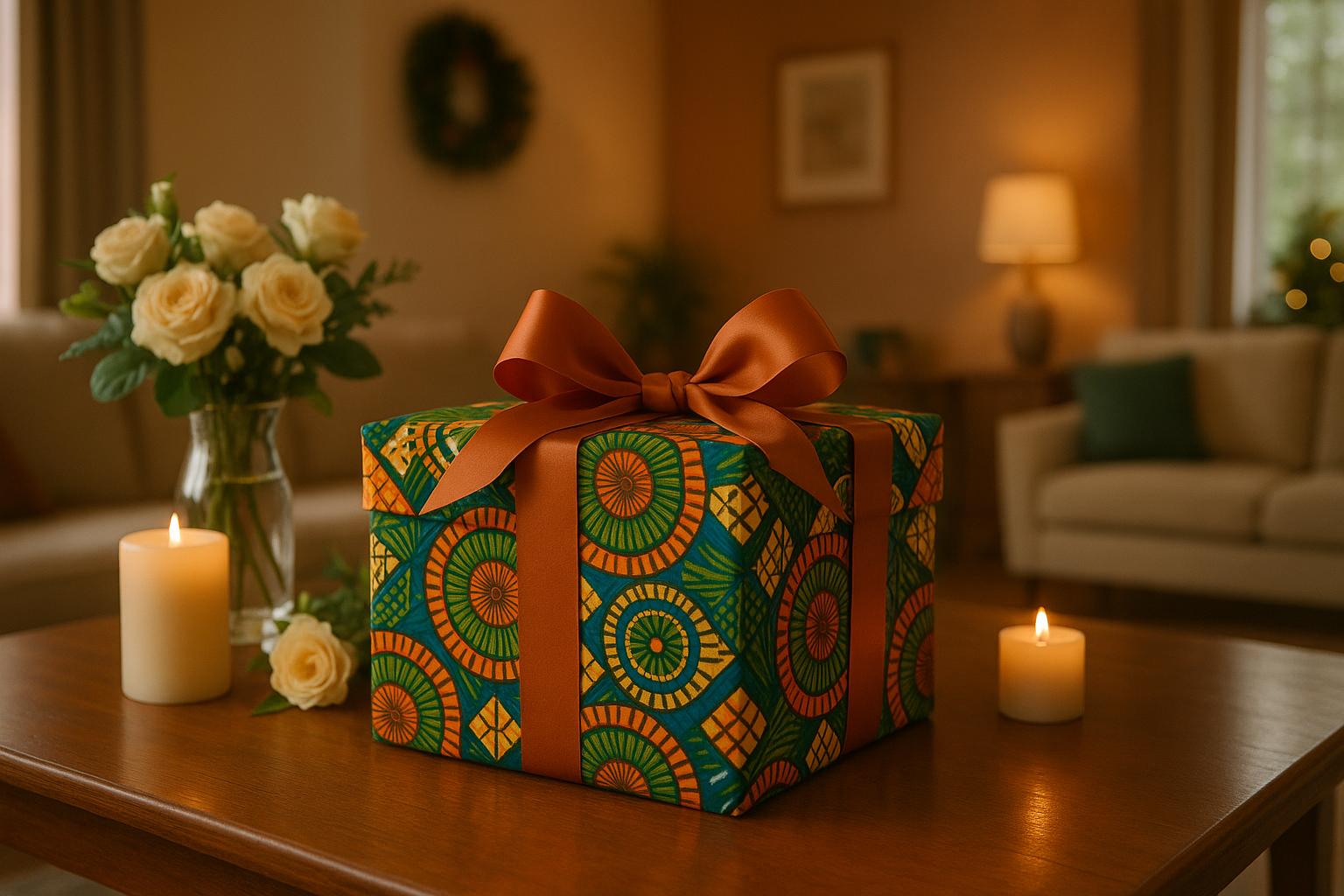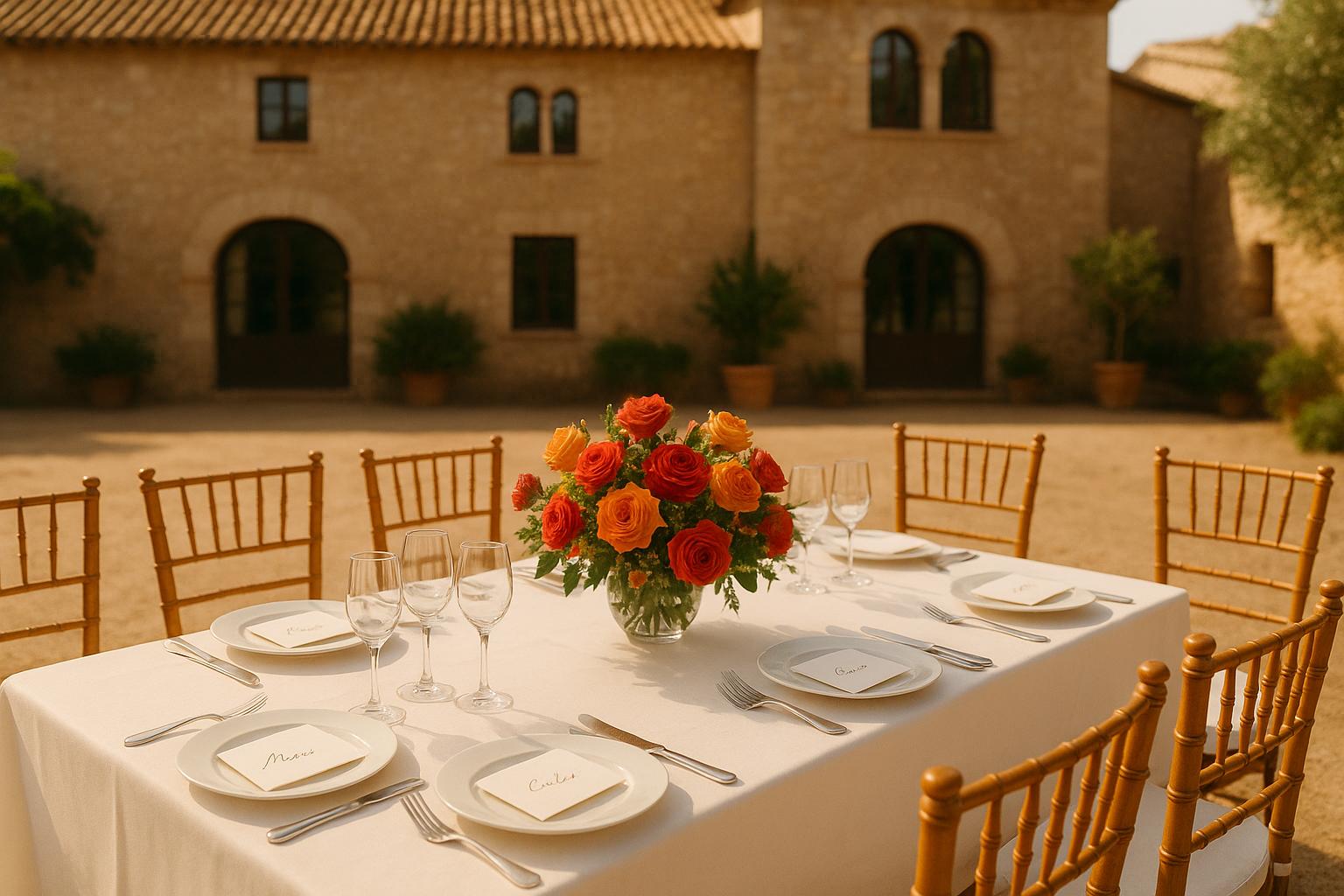
Nigerian Gift-Giving Etiquette for Holidays
Nigerian Gift-Giving Etiquette for Holidays
Gift-giving in Nigeria is more than just an exchange - it's a way to show respect, build relationships, and honor traditions. Here’s what you need to know about giving gifts during Nigerian holidays:
- Always use your right hand or both hands when presenting gifts. Using your left hand is considered disrespectful.
- Bring something for the host and their family. Thoughtful items like fruits, chocolates, or small toys for children are appreciated.
- Choose culturally appropriate gifts. Avoid alcohol or pork for Muslim families, and consider handmade or practical items for others.
- Wrap gifts neatly. Presentation matters, and gifts are often not unwrapped immediately.
- Avoid extravagant gifts. Modest, meaningful gifts are preferred to avoid making the recipient feel obligated.
Understanding these customs ensures your gesture is respectful and well-received. Whether you're gifting to Yoruba, Hausa-Fulani, or Igbo communities, knowing their preferences - like beadwork for Yoruba or prayer mats for Hausa-Fulani - adds a personal touch.
What to Do When Giving Gifts During Nigerian Holidays
Giving gifts during Nigerian holidays is more than just a kind gesture - it’s a way to show respect and strengthen relationships. Here are some tips to ensure your gift-giving aligns with Nigerian customs.
Present Gifts with Your Right Hand or Both Hands
When offering a gift, always use your right hand or both hands. Using your left hand alone is considered disrespectful, especially when giving gifts to elders or in formal settings. A warm smile and direct eye contact add a personal touch to your gesture.
Bring Something for the Host and Their Family
Showing up empty-handed is a no-go. Bring a thoughtful gift for your host, like fresh fruit, nuts, or chocolates. If there are children, small treats or toys are a great way to include them in the celebration.
Pick Suitable Gifts and Wrap Them Thoughtfully
Neatly wrapped gifts show effort and respect for the occasion. Be mindful of the recipient’s background - avoid alcohol or pork for Muslim families, and consider holiday treats or practical household items for Christian households. Handmade or locally crafted items can carry extra meaning and reflect thoughtfulness. Don’t expect gifts to be unwrapped immediately; it’s common for recipients to politely decline at first before eventually accepting.
What to Avoid When Giving Gifts During Nigerian Holidays
Understanding what to steer clear of when giving gifts during Nigerian holidays is crucial to showing respect for local customs and traditions. Here are some key practices to avoid to ensure your gesture is well-received.
Avoid Using the Left Hand
In Nigeria, giving or receiving gifts with your left hand is widely regarded as disrespectful. This belief is deeply rooted in the traditions of Nigeria's numerous ethnic groups, where the left hand carries negative connotations tied to impurity or bad luck.
As Mr. Jeff Odei, a Data Scientist, explains:
"Nigerian tradition associates the left hand with bad luck and disrespect. The left hand has traditionally been linked to 'unclean' things, impurity, or negativity, while the right hand is seen as a symbol of respect, honour, and positivity."
For example, among the Yoruba, the left hand is traditionally reserved for personal hygiene, making it inappropriate for gift-giving.
This practice becomes even more significant when dealing with elders. Prof. Francis Nwonwu, author of Philosophy of Proverbs in Igbo Culture, elaborates:
"In such cultures, giving or receiving something with the left hand is regarded as a serious act of disrespect. It is even more abominable and unpardonable if a younger person uses the left hand to give or receive something from an older person. In Igbo culture, such an action is interpreted as equivalent to giving or taking something with the anus."
Be Mindful of Religious Beliefs
Gift-giving in Nigeria also requires sensitivity to the country's religious diversity. For instance, when visiting Muslim families during holidays like Eid, it’s important to steer clear of gifts such as alcohol or pork-based products, as these conflict with Islamic dietary laws. Similarly, some Christian groups may avoid alcohol during certain periods, so neutral, non-alcoholic options are often the safest choice.
If you’re uncertain about what’s appropriate, consider gifts that are universally appreciated, such as fresh fruits, nuts, books, or handcrafted items. These options are thoughtful and align with various dietary and cultural practices.
Avoid Overly Expensive Gifts
While generosity is valued, overly extravagant gifts can sometimes cause discomfort or create an unintended sense of obligation. In Nigeria, where social balance is highly regarded, giving expensive gifts might disrupt this harmony. Instead, focus on thoughtful yet modest presents that express your respect and appreciation without putting undue pressure on the recipient to reciprocate.
Regional Gift Preferences in Nigeria
Nigeria's incredible cultural diversity creates a tapestry of unique gift preferences across its regions and ethnic groups. Thoughtful gift-giving in Nigeria often reflects an understanding of these regional differences, showing respect and cultural sensitivity.
Gift Preferences Across Major Regions
Nigeria’s major ethnic groups - Yoruba, Hausa-Fulani, and Igbo - each have distinct traditions that influence their gift preferences. Here's a quick overview:
| Region/Ethnic Group | Gift Ideas | Why They Matter |
|---|---|---|
| Yoruba (Southwestern Nigeria) | Beadwork, native clothing (Aso Oke or Ankara), kola nuts, carved sculptures | Represents cultural artistry and respect for tradition |
| Hausa-Fulani (Northern Nigeria) | Prayer mats, Islamic books, traditional clothing | Modest gifts that align with Islamic values |
| Igbo (Southeastern Nigeria) | Handmade crafts, handwoven fabrics, cultural artifacts | Highlights creativity and the thought behind the gift |
For the Yoruba people in southwestern Nigeria, gifts like beadwork, Aso Oke or Ankara clothing, kola nuts, and carved wooden sculptures are highly valued. These items celebrate the region's artistic traditions and show respect for their rich heritage.
In the north, where the Hausa-Fulani people reside, gifts often reflect Islamic values. Thoughtful and modest items such as prayer mats, Islamic books, or traditional clothing are excellent choices that honor their religious beliefs and daily practices.
The Igbo people of southeastern Nigeria appreciate gifts that emphasize creativity and craftsmanship. Handmade crafts, handwoven fabrics, and cultural artifacts are particularly meaningful, as they prioritize the effort and artistry behind the gift over its cost.
Symbolic and Handmade Gifts
Handmade and symbolic gifts hold a special place in Nigerian culture, as they often carry deep meaning and showcase the country’s artistic heritage.
Consider giving handwoven fabrics, wooden carvings, or locally crafted jewelry. These items are more than just gifts - they tell a story. For instance, handwoven fabrics like Aso Oke are steeped in centuries of tradition and are often worn during important celebrations. Wooden carvings, sculptures, and masks highlight Nigeria's artistic legacy while also carrying cultural or spiritual significance.
The personal touch of handmade gifts makes them particularly cherished. They connect recipients to their heritage in a way that mass-produced items simply cannot.
Want to make gifting even easier? Use GiftList to discover and organize culturally appropriate options that respect regional traditions and preferences.
sbb-itb-309de5c
Simplify Holiday Gift-Giving with GiftList
Finding the perfect gift while navigating Nigerian gift-giving customs can feel like a daunting task. That’s where GiftList steps in, making the process easier by helping you find, organize, and share gifts that honor Nigerian traditions. Let’s dive into how GiftList's features can transform your holiday gifting experience in Nigeria.
Use the Universal Wish List Maker
GiftList’s Universal Wish List Maker takes the hassle out of Nigerian holiday shopping by letting you create a list with items from any online store. Whether it’s handwoven Aso Oke fabrics, intricately carved wooden sculptures, or Islamic prayer mats, you can gather everything in one place, ensuring your list reflects the cultural and personal preferences of your loved ones.
You can even add images and notes to each item to explain its cultural significance. For instance, include a note about the symbolic meaning of a specific beadwork design or highlight the traditional importance of certain colors in regional clothing styles. These details not only make the gift more meaningful but also guide others to make thoughtful choices.
Sharing your wish lists removes the guesswork from holiday gifting. Instead of worrying about whether a gift aligns with someone’s cultural or religious values, recipients can create their own lists with items they’d love to receive. Plus, the platform helps avoid duplicate gifts by letting users mark items as purchased - a lifesaver during big celebrations where multiple family members might shop for the same person.
Get started by creating a GiftList for Nigerian cultural gifts and use the notes feature to provide insights about traditions, preferred styles, or regional preferences that are important to your family.
Get Personalized Suggestions with AI Genie
If you’re unsure where to start, GiftList’s AI Genie is here to help. This smart tool offers personalized gift suggestions tailored to Nigerian holidays and traditions. By considering details like age, gender, interests, and budget, Genie provides curated options that align with the cultural nuances of your recipient.
For the best results, include specific prompts when using Genie. For example, you might ask for “traditional Nigerian gifts for Eid under $50” or “handmade items celebrating Igbo traditions.” Genie processes these details and delivers a list of thoughtful options, complete with prices, ratings, and direct links to purchase.
"As the GiftList Founder Jonathan explains, Genie simplifies gift shopping by tailoring recommendations to cultural preferences".
Genie integrates seamlessly with your existing wish lists, so you can quickly add its suggestions to your holiday plans. This is especially useful if you’re shopping for people from different Nigerian regions, as Genie can adapt its recommendations to reflect various cultural traditions and preferences.
Start your journey with GiftList Genie by sharing details about your recipient’s background, beliefs, and the holiday you’re celebrating.
Explore Gift Guides
If you’re looking for inspiration, GiftList’s curated Gift Guides are a great place to start. These guides feature pre-selected collections of culturally respectful gifts organized by recipient, interest, and occasion. They’re designed to save you time while helping you choose gifts that honor Nigerian traditions.
These guides are especially handy when shopping for recipients from different regions or when you’re not familiar with specific cultural customs. Instead of spending hours researching, you can browse collections thoughtfully curated to reflect regional and cultural sensitivities. For example, you might find guides for religious holidays, traditional celebrations, or gifts tailored to specific age groups.
Browse various categories to strike the perfect balance between personal preferences and cultural appropriateness. From religious festivities to traditional ceremonies, these guides ensure your gifts are meaningful and in tune with Nigerian values.
You can also add items from the guides directly to your personal wish lists and customize them with notes about their cultural significance or the recipient’s preferences. This blend of curated suggestions and personal touches makes Nigerian holiday gifting both simple and thoughtful.
Explore GiftList's Gift Guides to find gifts that respect Nigerian traditions, making your shopping experience smooth and meaningful.
Conclusion: Mastering Nigerian Gift-Giving Etiquette
Navigating Nigerian gift-giving customs is all about showing respect, understanding cultural values, and being thoughtful toward your recipients. As we've discussed, these traditions play a vital role in maintaining mutual respect and deepening relationships during festive occasions. Always present gifts with your right hand or both hands, choose items that align with cultural and religious expectations, and take care to wrap them neatly. Keep in mind, an initial polite refusal is common, but gentle persistence usually leads to acceptance.
There are also important pitfalls to avoid. Never use your left hand when giving or receiving gifts, as this is considered disrespectful. Be especially mindful of religious sensitivities - like selecting appropriate gifts for Muslim recipients during Eid - and steer clear of overly extravagant presents that might cause discomfort. By following these practices, your gifts will not only be well-received but will also reflect cultural awareness and respect.
Gift choices can vary widely depending on the region and community. For Yoruba recipients in the southwest, consider beadwork or carved wooden sculptures. In the north, prayer mats and Islamic books are thoughtful options for Hausa-Fulani communities. Meanwhile, handmade crafts and symbolic artifacts make meaningful gifts for Igbo people in the southeast. Understanding these nuances adds a personal touch that goes beyond the gift itself.
GiftList makes embracing these traditions easier. With its Universal Wish List Maker, AI-powered Genie suggestions, and curated Gift Guides, the platform takes the guesswork out of choosing culturally respectful and meaningful gifts. These tools allow you to focus on what truly matters - celebrating relationships and building stronger connections during Nigeria's festive seasons.
Ready to make your holiday gifting more thoughtful? Explore GiftList's curated options and discover how technology can seamlessly blend with tradition to create meaningful and respectful exchanges.
FAQs
Why is it customary to use your right hand or both hands when giving gifts in Nigeria?
In Nigeria, offering or accepting gifts with your right hand or both hands is seen as a gesture of respect and courtesy. The right hand is traditionally linked to honor and cleanliness, while the left hand is often viewed as inappropriate for such exchanges. This custom highlights the importance of politeness and respect, which are deeply ingrained in Nigerian gift-giving traditions.
What are thoughtful and culturally appropriate gifts for Nigerian Muslim families during holidays?
When choosing gifts for Nigerian Muslim families during the holidays, it’s thoughtful to pick items that honor both their religious and cultural traditions. Some great ideas include Islamic art, decorative lanterns, prayer mats, or copies of the Quran. Traditional clothing, like kaftans or hijabs, can also make a meaningful and appreciated gift. For something sweet, consider gifting dates, baklava, or other festive treats that are often enjoyed during celebrations.
When presenting your gift, remember to use your right hand or both hands, as this gesture shows respect. For younger family members, modern gifts like fragrances, jewelry, or electronics might be a hit. Ultimately, the most important thing is to choose a gift that shows thoughtfulness and care, making the holiday even more memorable.
What are the key gift-giving customs to follow during Nigerian holidays?
Honoring Nigerian Traditions in Gift-Giving
When giving gifts in Nigeria, it’s important to respect cultural traditions to show thoughtfulness and understanding. One key practice is to always present gifts using your right hand or both hands. In many ethnic groups, like the Yoruba, offering something with your left hand is considered disrespectful.
Choosing the right gift also matters. Simple and thoughtful items - like fabrics, handcrafted goods, or food - are often appreciated, especially when they reflect the recipient’s cultural heritage. If you’re visiting someone’s home, bringing a small token, such as fruit or chocolates, is a kind gesture. And don’t forget the kids! Including a little treat for them is a warm way to show consideration.
Finally, when receiving a gift, accept it with gratitude. Expressing thanks not only shows respect but also helps build stronger connections and goodwill.

